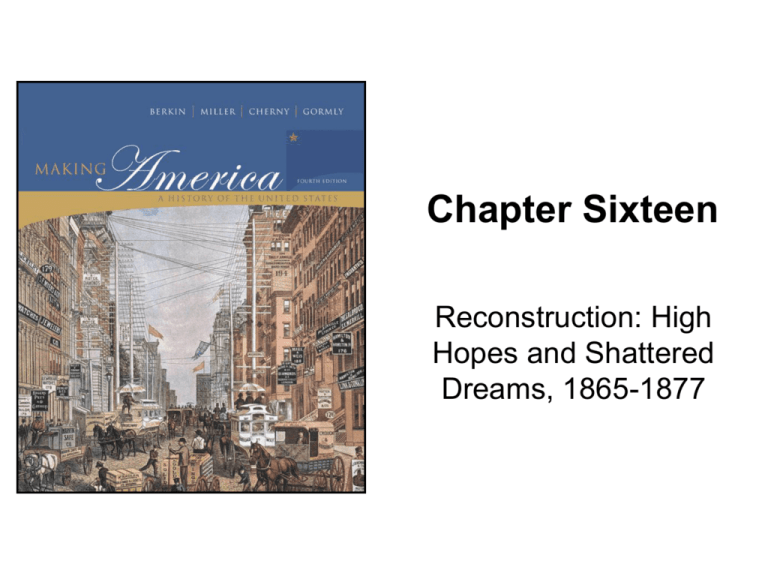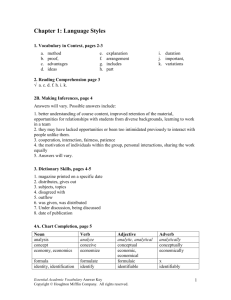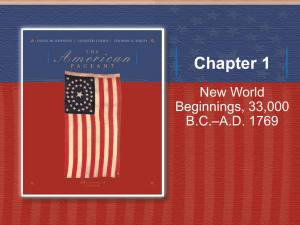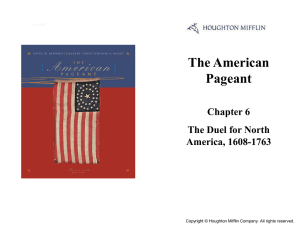
Chapter Sixteen
Reconstruction: High
Hopes and Shattered
Dreams, 1865-1877
Berkin, Making America
Chapter 16
A major example of Abraham Lincoln's
policy of leniency toward the defeated
South is provided by his
1. willingness to have the federal government assume
responsibility for all debts incurred by the government of
the Confederacy.
2. choice of a southerner as his vice president in the 1864
election.
3. offer to consider revoking the Emancipation
Proclamation.
4. decision that a state government could be organized after
only 10 percent of the voters took an oath of loyalty to
the Union.
Copyright © Houghton Mifflin Company. All rights reserved.
16-2
Berkin, Making America
Chapter 16
A major example of Abraham Lincoln's
policy of leniency toward the defeated
South is provided by his
4. decision that a state government could be organized
after only 10 percent of the voters took an oath of
loyalty to the Union.
Hint: This so-called Ten-Percent Plan also included a
requirement that slavery be abolished in each
reconstructed state’s constitution. See pages 460–
461.
Copyright © Houghton Mifflin Company. All rights reserved.
16-3
Berkin, Making America
Chapter 16
The Thirteenth Amendment
1. stripped many leaders of the Confederacy of their
citizenship.
2. barred the president from defining how southern
states could reenter the Union.
3. was necessary because the Emancipation
Proclamation had not abolished slavery
everywhere.
4. was later repealed by the Fifteenth Amendment.
Copyright © Houghton Mifflin Company. All rights reserved.
16-4
Berkin, Making America
Chapter 16
The Thirteenth Amendment
3. was necessary because the Emancipation
Proclamation had not abolished slavery
everywhere.
Hint: On the day that it went into effect, the
Emancipation Proclamation ended slavery only in
states still in rebellion. See page 458.
Copyright © Houghton Mifflin Company. All rights reserved.
16-5
Berkin, Making America
Chapter 16
Sharecropping arose because
1. many southerners, white as well as black, had no
means of acquiring land.
2. the Freedmen's Bureau advised people that it
would lead to land ownership in the not-toodistant future.
3. the government provided loans that made it
possible for poor farmers to become landowners.
4. Southern banks lent money on easy terms to
anyone who agreed to become a sharecropper.
Copyright © Houghton Mifflin Company. All rights reserved.
16-6
Berkin, Making America
Chapter 16
Sharecropping arose because
1. many southerners, white as well as black, had no
means of acquiring land.
Hint: Unable to buy land, they rented a plot of land
and paid the owner a share of the crop they grew.
See page 467.
Copyright © Houghton Mifflin Company. All rights reserved.
16-7
Berkin, Making America
Chapter 16
Black codes were enacted
1. by Radical Republicans in Congress to punish the
Deep South.
2. to force African Americans into a legally
subordinate position in southern society.
3. during Black Reconstruction in order to protect
former slaves from abuse.
4. under the terms of the Fourteenth Amendment to
the Constitution.
Copyright © Houghton Mifflin Company. All rights reserved.
16-8
Berkin, Making America
Chapter 16
Black codes were enacted
2. to force African Americans into a legally
subordinate position in southern society.
Hint: Southern legislatures enacted these laws in
order to restrain African Americans in a variety of
ways and to assure a ready supply of labor. See
pages 468–469.
Copyright © Houghton Mifflin Company. All rights reserved.
16-9
Berkin, Making America
Chapter 16
In the aftermath of emancipation,
freedmen
1. quickly undertook to establish schools and
churches.
2. tried to emigrate en masse to the North.
3. hoped to return to their ancestral lands in Africa.
4. by and large stayed with and continued to work
for their former masters.
Copyright © Houghton Mifflin Company. All rights reserved.
16-10
Berkin, Making America
Chapter 16
In the aftermath of emancipation,
freedmen
1. quickly undertook to establish schools and
churches.
Hint: See pages 463–466.
Copyright © Houghton Mifflin Company. All rights reserved.
16-11
Berkin, Making America
Chapter 16
Radical Republicans in Congress
advocated all of the following except
1. an equal distribution of wealth to all Americans.
2. immediate emancipation.
3. civil liberties for freedmen.
4. full citizenship for former slaves.
Copyright © Houghton Mifflin Company. All rights reserved.
16-12
Berkin, Making America
Chapter 16
Radical Republicans in Congress
advocated all of the following except
1. an equal distribution of wealth to all Americans.
Hint: This is the correct choice. Because Radical
Republicans did not insist on land redistribution
when Congress took control of Reconstruction,
sharecropping emerged. See pages 466–467.
Copyright © Houghton Mifflin Company. All rights reserved.
16-13
Berkin, Making America
Chapter 16
All of the following statements about
Andrew Johnson are correct except
1. he was a southerner who remained loyal to the
Union.
2. he agreed with the Radicals about Reconstruction
and the future of former slaves.
3. he disliked the southern planter elite.
4. he was to strengthen the white middle class in the
South.
Copyright © Houghton Mifflin Company. All rights reserved.
16-14
Berkin, Making America
Chapter 16
All of the following statements about
Andrew Johnson are correct except
2. he agreed with the Radicals about Reconstruction
and the future of former slaves.
Hint: Because this statement is not true, it is the
correct choice. He did not agree with Radical
Reconstruction, instead favoring the formula
proposed by Lincoln, and he believed that the
freedmen should be subordinate to white
southerners. See pages 462–463.
Copyright © Houghton Mifflin Company. All rights reserved.
16-15
Berkin, Making America
Chapter 16
By removing Edwin Stanton as
secretary of war, Andrew Johnson
1. successfully reasserted the concept of separation
of powers.
2. had to face the possibility of removal from office.
3. was then able to remove the popular Ulysses
Grant as general-in-chief.
4. violated the Civil Rights Act of 1866.
Copyright © Houghton Mifflin Company. All rights reserved.
16-16
Berkin, Making America
Chapter 16
By removing Edwin Stanton as
secretary of war, Andrew Johnson
2. had to face the possibility of removal from office.
The House impeached him, but the Senate failed to
remove him from office by one vote. See pages
472–473.
Copyright © Houghton Mifflin Company. All rights reserved.
16-17
Berkin, Making America
Chapter 16
The congressional Reconstruction
amendments to the Constitution did
not
1. address the issue of the right of African Americans
to vote.
2. extend the Bill of Rights to the states.
3. prohibit disenfranchisement on the basis of sex.
4. settle the issue of citizenship for African
Americans.
Copyright © Houghton Mifflin Company. All rights reserved.
16-18
Berkin, Making America
Chapter 16
The congressional Reconstruction
amendments to the Constitution did
not
3. prohibit disenfranchisement on the basis of sex.
Hint: Neither the Fourteenth nor the Fifteenth
Amendments addressed the issue of the
women’s vote. See pages 471–475.
Copyright © Houghton Mifflin Company. All rights reserved.
16-19
Berkin, Making America
Chapter 16
The term “New Departure
Democrats” describes
1. northern Democrats who opposed Radical
Reconstruction.
2. southern Democrats who accommodated
themselves to black suffrage and emancipation.
3. freedmen who supported the southern Democratic
Party.
4. northern Republicans who often voted with
southern Democrats in Congress.
Copyright © Houghton Mifflin Company. All rights reserved.
16-20
Berkin, Making America
Chapter 16
The term “New Departure
Democrats” describes
2. southern Democrats who accommodated
themselves to black suffrage and emancipation.
Hint: They decided to accept these new realities in
order to bring an end to federal involvement in
their states under Radical Reconstruction. See
pages 479–480.
Copyright © Houghton Mifflin Company. All rights reserved.
16-21



